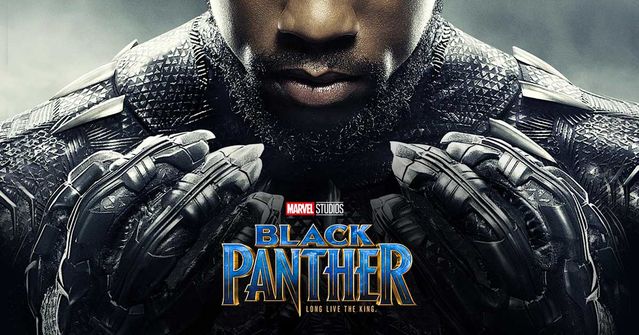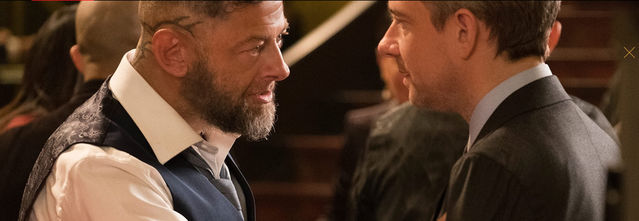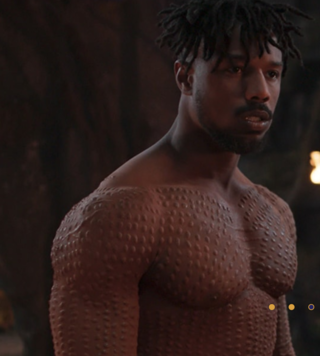Politics
The Racial Politics of Black Panther
The film's racial dynamics are interesting, and at times, problematic.
Posted February 20, 2018 Reviewed by Ekua Hagan

Seen through a racial lens, Black Panther is an important film. Written and directed by black men, it tells a story about black characters in a fictional black land. Hollywood has essentially refused to make such Afrocentric films on the grounds that they wouldn’t attract a sufficient audience. Black Panther’s box-office success may permanently disrupt this narrative, creating conditions for a more inclusive industry and a wider range of films.
But there is more to this film, racially speaking, than the racial makeup of its talent and its box-office appeal. Black Panther also offers racial commentary about our own world.
To that end, below are six racial dynamics worth noting and unpacking. They are offered in the spirit of better appreciating a courageous film that not only tells an entertaining story but takes on important social issues and questions.
Warning: spoilers ahead.
1. The Black Panther is black.
Well, duh! But as Kristen Page-Kirby pointed out, he “is not a superhero who happens to be black. His blackness...goes to the absolute center of his identity...” There is really no white superhero equivalent. There cannot be, given this country’s (and this world’s!) racial politics.
For T’Challa, his blackness and his Wakandan heritage are a source of pride. Other superheroes can exhibit national pride (hello, Captain America), but white pride is off-limits for heroes, just as it is off-limits for us mere mortals, at least those of us who value being part of the cultural mainstream. This is as it should be.
For T’Challa, for other Africans, and for African Americans, racial pride is legitimately earned by overcoming or even just surviving an oppressive history and reality. White men (and women) can be proud too. Many have also overcome oppression and other obstacles, but their oppression was unrelated to their whiteness, and therefore, their pride cannot be related to whiteness either. T'Challa is aware of his blackness and is unapologetically proud of it.
2. The relationship between the Marvel Black Panther and the prominent 1960s civil rights groups and leaders is... complicated.
Black Panther first appeared in Fantastic Four #52 (July 1966), three months before the Black Panther Party was formally founded. Though the black panther logo was also used by the Lowndes County Freedom Organization, and the segregated World War II Black Panthers Tank Battalion, there seems to be no evidence that the comic was inspired by either. In fact, despite the similar names and proximate origin, co-creator Stan Lee said "the name was inspired by a pulp adventure hero who had a black panther sidekick." Indeed, sharing a name with an armed, revolutionary, socialist organization was sufficiently inconvenient that Marvel renamed the character to Black Leopard in Fantastic Four #119 (1972). T'Challa explains his reasoning to The Thing thus:
“I contemplate a return to your country, Ben Grimm, where [the Black Panther name] has — political connotations. I neither condemn nor condone those who have taken up the name — but T’Challa is a law until himself. Hence, the new name — a minor point, at best, since the panther is a leopard.”
The name change was short-lived, with the Panther returning less than a year later, but it seems that the creative team of the '60s and early '70s found the link to the Panther party more an annoyance and distraction than inspiration.
For their part, I'm certain that Black Panther Party leaders like Bobby Seale, Eldridge Cleaver, and Elaine Brown would have frowned at T'Challa co-operating with CIA operatives and the U.S. government more broadly. Yet, they would have certainly approved of the first mainstream superhero of African descent and likely found common ground over their mutual concern with the well-being and self-determination of black people.
The Black Panther Party was more radical than the comic. How could it not be? Even with a black hero, Jack Kirby and Stan Lee were both white and Marvel was primarily targeting a white audience, while the Black Panther Party was black-led and clearly focused on the black agenda. But as Jamil Smith aptly pointed out in his piece for Time, "the revolutionary thing about Black Panther is that it envisions a world not devoid of racism but one in which black people have the wealth, technology, and military might to level the playing field." With those resources in hand, the Black Panther Party might have adopted very different tactics.
Some writers have suggested that T'Challa's philosophy is similar to that of Martin Luther King, Jr. For example, N.Y. Post's Sara Stewart writes "T’Challa, though, is a pacifist, the Martin Luther King Jr. to Killmonger’s Malcolm X." While I have previously made a comparison to MLK when discussing Professor Xavier, in this case, I think the analogy, while well-intentioned, is not well informed.
First of all, while Malcolm X shared Killmonger's concerns about black inequality, by the time he was killed, he had come to realize that allies for the cause of liberation and equality exist across racial lines. Secondly, T'Challa is not a pacifist. To be sure, he does not enjoy violence and spares M’Baku’s life in the first ritual battle. And when he lands what turns out to be the fatal blow against Killmonger, there seems to be more mourning and compassion than rejoicing. But he accepts both ritual battles and he is clearly willing to use violence when he puts on the Panther suit to do battle with Claw and other thugs.
A reluctant warrior, perhaps, but T'Challa is clearly a warrior, not a pacifist. And while it's easy to imagine King saying "We are all one tribe," as T'Challa does in his speech to the United Nations, the film offers no examples of him engaging in nonviolent resistance, which distinguished King and his followers from the Black Panther Party, Malcolm X, and Stokely Carmichael, who agreed on the problems but not on the strategies.
None of this is intended as a criticism of either the film or its lead character. King, like the Black Panther Party, was also operating from a position of weakness, relative to the dominant power structure. As the head of a resource-rich, sovereign nation, T'Challa does not need to shame those who hold structural power to do the right thing. He can simply opt to do it, as he does near the end of the film when he decides that he and Wakanda have a moral duty to the world.
Upon reaching this conclusion, he decides to focus his energy not on overpowering his enemies but on building an infrastructure that better supports the disenfranchised. This includes African American youth, but it also seems aimed at a much larger international community.
Would King have supported such a global strategy? Had he had the resources to do so, I think he would have, but so, I think, would have all the other prominent civil rights leaders of the 1960s. Besides the access to far greater resources, T'Challa has much in common with all of them.
3. Klaw is a representation of white supremacy.
The Black Panther film doesn’t provide much of Ulysses Klaw’s backstory, but he is the son of Nazi war criminal Colonel Fritz Klaue, a member of the Blitzkrieg Squad led by Baron Strucker, one of the leaders of Hydra. Klaue was sent to Wakanda by Adolf Hitler in order to learn the African nation’s secrets. After the war ended, he “anglicized his name to Klaw and raised his son [Ulysses] with tales of Wakanda” [source]. After coming of age, Ulysses becomes an arms dealer in South Africa and travels to Wakanda where he forces (enslaves) Wakandans to mine Vibranium. Thus, Klaw (literally) represents the legacy of the Nazis and therefore also of white colonialism and white supremacy.
As such, his primary motivation is greed. He has no interest in Wakandan culture or its people. He wants only to extract its valuable resource, Vibranium, and is willing to kill anyone in his way, including the Wakandan king, T’Chaka. Klaw seems to die in this film, but white supremacy has proven to be remarkably resilient. We will see Klaw again, probably soon.
4. CIA agent, Everett K. Ross as a representation of the every(white)man.
If Klaw is the representation of white supremacy, then Ross is the comforting antithesis. He not only likes and respects T’Chaka’s son, T’Challa (the Black Panther) but essentially earns his “pass” by stepping in front of a bullet to save one of T’Challa’s guards.
Though in many ways, Ross essentially functions as a reverse “magic negro”[1] — a character whose sole purpose seems to be to promote the well-being of the lead (in this case, black) characters — he is also an avatar, an audience surrogate who represents the way Panther is perceived by well-meaning white men (and women).
In the words of Ross’s creator, Christopher Priest, "Comics are traditionally created by white males for white males. I figured, and I believe rightly, that for Black Panther to succeed, it needed a white male at the center, and that white male had to give voice to the audience's misgivings or apprehensions or assumptions about this character.” [source]
Importantly, the anti-racist white ideal cannot remain skeptical toward blackness. On the contrary, he/she must (relatively soon) embrace the racial other, and, at least in their own fantasies, become their allies and friends. Thus, despite having no special powers or even understanding of Wakandan culture and traditions, by shooting down the ships leaving Wakanda at Killmonger’s orders, Ross winds up playing a vital role in not only assisting T’Challa but in preserving Wakandan traditions.

5. Erik Killmonger represents...
The racial symbolism of Killmonger is, for me, one of the more unsatisfying aspects of this film. It is tempting to think of Killmonger as a representation of his people, the African American counterpart to T’Challa’s African identity. Indeed, the smart viewer will nod along when he challenges T’Challa’s claim that he has no responsibility to help black Americans: “Not your own?” he asks, “Did life start on this continent? Aren’t all people your people?”

Unfortunately, Killmonger is too filled with anger to respond affirmatively to his own question. He is justifiably angry at his own people’s oppression, but he has internalized the notion that one has to be either the conqueror or the conquered. He wants to free his people, but he seems willing to have other people (the oppressors) suffer in turn. It is not so much justice and freedom that Killmonger wants as the power to dominate others.
This is not an uncommon phenomenon. There are studies (e.g., Nansel, Overpeck, Haynie, Ruam, & Scheidt, 2003) that show that those who are bullied are often more willing to carry weapons and perpetrate violence against others. Certainly, there are African Americans who hold such beliefs, but Killmonger is essentially the only representation of African Americans in the film. As such, the film could be read as an indictment not just of this particular point of view but of African American men more broadly. For those who already tend to blame racial inequality on so-called "black on black" violence, it is not much of a stretch to find that view vindicated in the film.
This is certainly not what the filmmakers intended and I hope not what most viewers come away with. The film is an indictment of Killmonger and his philosophy but is sympathetic toward his (and his people’s) suffering. We don’t want Killmonger to unleash the power of Vibranium on an unsuspecting world, but we recognize the need to end oppression and racialized poverty.
When Killmonger dies at the end of the film, there is, for many, little pleasure at his death. He needed to die because the philosophy of racialized vengeance has to die, but we nevertheless see him (rightfully) as a victim of unfortunate circumstances he could not control and we can understand and even relate to his anger, even as we reject his vision for how to make things better.
As Nate Marshall so aptly pointed out, one of this film's many strengths is that it "fundamentally questions the nature of power, freedom, and responsibility." I agree. I have no objection to the Killmonger character. I just wish he wasn't the only significant African American character in the film. Here, as everywhere, there are the dangers of a single story.
6. Wakanda has problems. There are lots of Wakanda fans out there and for good reason. With Wakanda, we all bear witness to an African country characterized not only by its natural beauty but by its natural resources and highly developed technologies. It is meaningful, as well, that Wakandan women seem to be valued for their strength and assertiveness, rather than repressed or punished. Certainly, T'Challa is a worthy leader surrounded by capable and talented warriors and advisors. There's much to like.
At the same time, the Wakanda we see in the first Black Panther film has its problems. For a supposed advanced nation, the Wakandas seem unusually highly invested in military technology and have opted to retain not only a family monarchy but a ritual fight that could (and does) result in an unpredictable and dangerous transfer of power.
It is problematic as well that Wakanda is so completely ethnically homogeneous that one must literally have a brand to gain entry. To be sure, deciding that Wakanda needs to become less insular is part of T’Challa’s transformation, but the “old” Wakanda — the one we see throughout most of the film, seems rather invested in its own ethnic purity. Imagine a homogeneously white nation-state that brands its citizens and restricts entry only to its own people. It is an inaccurate and therefore unfair comparison[2], but it still feels off, especially since one Wakandan tribe seems to live in relative isolation with little access to Wakanda's considerable resources and technology.
Moreover, it appears that the king's power is absolute. There is no (visible) democratic process, no checks and balances, no protections for Wakandan citizens. With T'Challa on the throne, there is no need for concern, but strong societies are structured so that they can survive individual failings and difficult transitions. It is not at all clear that Wakanda can. Perhaps T'Challa will set all things right (there are benefits to absolute power). In the meantime, like the rest of the world, Wakanda has its share of domestic challenges too.
Endnotes:
[Creative Commons License] This work is licensed under a Creative Commons Attribution-NoDerivs 3.0 Unported License.
References
[1] Spike Lee and others have appropriately criticized certain films for their use of "the magical negro," a black character (often with mystical powers or unusual wisdom) whose sole purpose seems to be to support the film's white protagonists. Though seemingly positively depicted, the one-dimensional nature of these characters strips them of their humanity. They exist only as a prop to support the growth or ambition of whiteness. There are no "magical negroes" in Black Panther, but Ross has many similar characteristics as the film's only non-villainous white character in an Afrocentric story. He's moral, kind, courageous, and selfless — a good (white) man, if ever there was one, but either despite my whiteness or because of it, I found it difficult to relate to him. Perhaps this speaks to my discomfort with my own racial politics and reluctance to identify with the "white ally" ideal or perhaps there is something just a bit off about a character whose only reason for being is to serve as a white conduit to a black story.
[2] This imaginary white country would presumable exist in a world in which most power and wealth is concentrated in white hands, which would make it part of the dominant group, while Wakanda is a small black oasis in a predominantly white world, which locates it in the margins of society.




